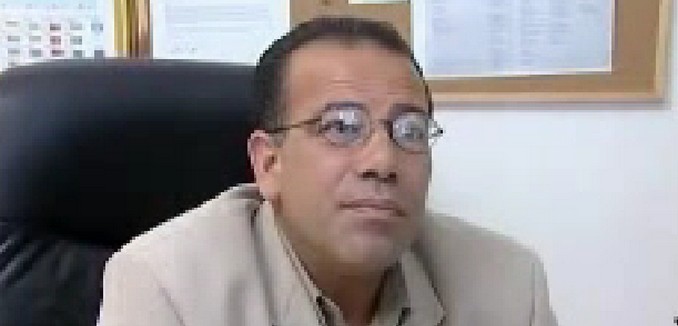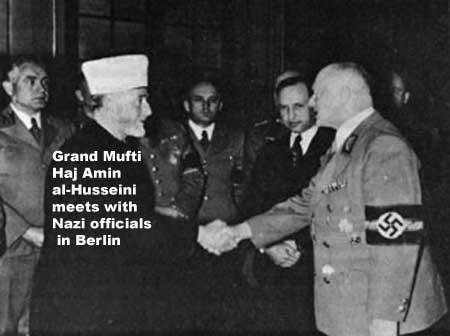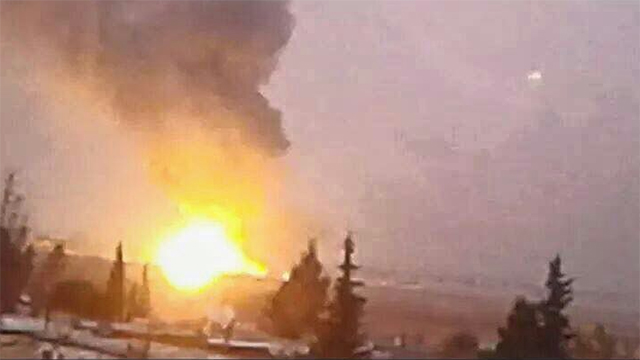
[Photo: Dave Bender / YouTube ]
Blogger “Elder of Ziyon” published a translated interview with Palestinian human rights activist Bassam Eid yesterday. The interview with Eid was originally conducted in Hebrew by Ishai Friedman and was published on his blog.
One of the central subjects of the interview was a supposed Palestinian boycott of Israel and Israeli settlements.
Well, what happens?The interview also covers Eid’s opinions of Hamas (Gazans don’t support it but “are afraid to talk.”), the Palestinian Authority (“political corruption is a government that the Palestinian public know nothing of what is happening in it.”) the state of human rights organizations (“today all organizations Israelis and Palestinians, all of them deal with Israel.”) and the funding of these groups (“if I want to establish an anti-Israel NGO, I promise you tomorrow I would get a half a million dollars from Sweden.”)
“Abbas will not feed them and won’t provide them jobs. After Protective Edge, it was agreed to put another 5,000 workers from Gaza to Israel so this they boycott? I beg you to give me more jobs then demand a boycott? And even if they prohibit selling Palestinian produce to Israel your economy will not hurt. Who would hurt are those Palestinians who earn four or five times in Israel than in the territories. ”
And the Authority’s statement about boycotting the settlements?
“It shows you the disconnect between the public and its leaders. That there is no boycott. There is one “hero,” Mustafa Barghouti, who is a very corrupt. He stole money from Saudi Arabia meant to buy them ambulances. He states that he invented the boycott of Israel, and he tours across Europe and talks about a boycott of Israel. Every other day he is in Sweden and they listen to him but let him go and declare a boycott in Ramallah and the refugee camps.”
So the whole story is a bluff?
“This is a big hoax on the part of the Palestinians. What, Arabs from the territories do not work and buy from Rami Levi in Gush Etzion? It is not enforced and can not be enforced. Bir Zeit buys Strauss Ice Cream. Grocery store there, the seller hung a sign, this place sells purely Israeli products.”
Eid set off a controversy last week when he criticized the United Nations Relief and Works Agency (UNRWA) in an op-ed in The Jerusalem Post. Eid wrote that instead of helping the Palestinians, UNRWA “depends on death and the visual suffering of five million Palestinians who continue to wallow in and around UNRWA facilities.” In order to reform UNRWA, Eid proposed a five point program:
Eid noted that UNRWA couldn’t even provide an exact number of Palestinian refugees, about which it “should be the authoritative source.”
- Audit all funds allocated to UNRWA, which operates with a $1.2b. budget.
- Introduce UN High Commissioner for Refugees standards to UNRWA, to encourage permanent refugee settlement.
- Cancel the UNRWA war curriculum, based on principles of jihad, martyrdom and right of return by force of arms.
- Demand that UNRWA schools conform to the UNRWA slogan: “Peace Starts Here.”
- Dismiss UNRWA employees affiliated with Hamas, defined by the donor nations to UNRWA as a terrorist entity.
Eid’s op-ed provoked a furious response from UNRWA’s spokesman, Chris Gunness, who called the Post “unbalanced” and demanded a boycott of the paper.
“Elder of Ziyon” noted that Gunness didn’t address the bulk of Eid’s claims, and instead resorted to blasting The Jerusalem Post. The blogger has recently been documenting what Eid refers to as UNRWA’s “war curriculum,” and condemned Gunness for ignoring the charge.
In The Real Palestinian Refugee Crisis, which was published in the May 2014 issue of The Tower Magazine, Asaf Romirowsky explained how UNRWA perpetuates Palestinian statelessness:
UNRWA’s role in perpetuating and even expanding the refugee problem is a complex one; but, more than anything else, it is the result of the agency’s own definition of a Palestinian refugee—which is unique in world history. The standard definition of a refugee, which applies in every case except that of the Palestinians, includes only those actually displaced in any given conflict. UNRWA has defined a Palestinian refugee as anyone whose “normal place of residence was Palestine during the period 1 June 1946 to 15 May 1948 and who lost both home and means of livelihood as a result of the 1948 conflict.” But it has also continually expanded this definition, now stating “the children or grandchildren of such refugees are eligible for agency assistance if they are (a) registered with UNRWA, (b) living in the area of UNRWA’s operations, and (c) in need.”
As a result, the number of official Palestinian refugees—according to UNRWA— has expanded almost to the point of absurdity. The best estimates are that perhaps 650,000 Palestinians became refugees in 1948-1949; but UNRWA now defines virtually every Palestinian born since that time as a refugee. That number now reaches well into the millions. This is quite simply unprecedented. In no other case has refugee status been expanded to include subsequent generations over a period of decades.







